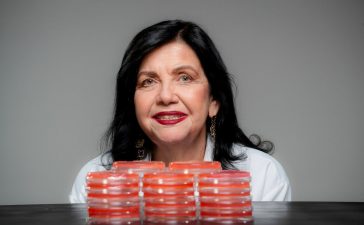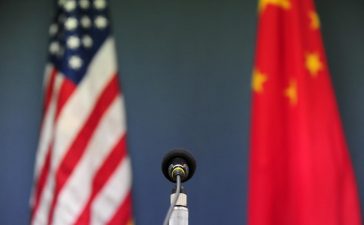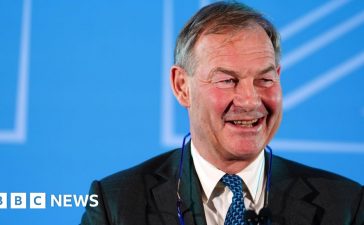Key events
European shares are drifting lower, while crude oil prices are also in the red.
The UK’s FTSE 100 has lost 6 points to 8,597 while the German Dax and France’s CAC have both slid by around 0.4%. Oil prices are trading about 1% lower for both Brent crude and US crude, the two global benchmarks.
Tui shares, listed in Frankfurt after the company moved its main listing from London last year, fell by 10% after the tour operator reported bigger losses for the second quarter, even though it stuck to its profit and revenue outlook for this year.
The company’s underlying operating loss worsened by €18m to €207m over the quarter. The chief executive Sebastian Ebel said the company had been hit by the late timing of Easter, which meant people were taking their Easter and summer holidays later than usual, as well as the overall economic climate. He said:
Given the economic conditions, 2025 will be challenging. Europe needs new momentum. We must return to an overall economy that is growing. More investment, more freedom – less regulation and less bureaucracy. This will strengthen the economy and consumer behavior.
Our focus is now on the important summer business. We are offering more and more products in more destinations for existing and new customers.
DHL to merge UK e-commerce arm with Evri to create parcel giant

Lauren Almeida
The German delivery group DHL will merge its e-commerce business with its British rival Evri, in a deal that will to create one of the biggest parcel delivery businesses in the country.
DHL has agreed to buy a stake in Evri, which is owned by the American investment firm Apollo. As part of the deal, it will combine its British e-commerce business with Evri.
The newly combined group is expected to deliver more than 1bn parcels and 1bn letters every year.
Martijn de Lange, the chief executive officer of Evri, said over the last decade the business had grown “ten-fold” in size and the deal would “further expand our access into the European and global e-commerce markets.”
The new business, which will be led by de Lange, will have more than 30,000 couriers and van drivers, 12,000 staff and a fleet of 8,000 vehicles.
Apollo bought Evri, formerly known as Hermes, in 2024 from its previous private equity owner Advent International, in a deal that valued the parcel delivery business at £2.7bn. Apollo will remain the majority shareholder in Evri.
The agreement between DHL and Evri is the latest in a series of deals in the sector. In April the Polish parcel locker firm InPost agreed to buy the UK parcel delivery company Yodel in a £106m deal. Last year the owner of Royal Mail, International Distribution Services, was bought by the Czech billionaire Daniel Křetínský for £3.6bn.
The EU’s highest court has cancelled a decision to withhold Ursula von der Leyen’s text messages with a pharmaceutical executive during the pandemic, in a significant defeat for the commission president.
The European court of justice on Wednesday annulled a decision taken by the European Commission in November 2022 to deny the New York Times access to the messages, after a freedom of information request by the paper.
The court said that, in its refusal, the commission did not respect the EU’s access to documents law. In a withering assessment it said the commission had “not given a plausible explanation to justify the non-possession of the requested documents”.
It was not immediately clear if the commission, which still has the right to appeal, would release the messages. In a statement that it would “closely study” the ruling, the EU executive suggested it still intended to block access to the texts, saying it would “adopt a new decision [on the FoI request] providing a more detailed explanation”.
More on Bank of England rate-setter Cathy Mann’s comments.
Businesses will need to show they are keeping a lid on prices before there can be further interest rate cuts, according to the Bank of England interest rate-setter Catherine Mann.
In a warning to retailers and consumer goods companies to resist pushing up prices by more than the increase in their costs, Mann said she was wary of firms looking to rebuild their profit margins after a squeeze in recent years.
“I need to see the loss of pricing power, I need to see that firms are starting to be much more moderate in setting their prices,” she said.
Mann, a former chief economist at the Organisation for Economic Co-operation and Development, was one of two policymakers who voted to hold interest rates at 4.5% at a meeting of the Bank’s monetary policy committee last week. A majority of five members voted to cut by a quarter point to 4.25%, while two voted for a steeper half-point reduction.
Shares in GSK rose as much as 3% after the UK pharma company agreed to acquire a liver disease drug from US biotechnology firm Boston Pharmaceuticals for up to $2bn.
The drug, called efimosfermin, is going into late-stage clinical trials and treats steatotic liver disease (SLD), which affects up to 5% of the world’s population. It is a condition where a lot of fat accumulates in the liver, which can lead to inflammation and fibrosis.
The medication aims to treat metabolic dysfunction-associated steatohepatitis (MASH), including cirrhosis, and will also be developed as a potential treatment for alcohol-related liver disease (ALD), both forms of SLD. Assuming phase III trials go well, the drug could be on the market in 2029.
ALD affects about 26 million patients globally, and together with MASH, is the leading cause of liver transplants in the US, and thus a burden on healthcare systems.
Photograph: James Boardman/Alamy
GSK will pay $1.2bn upfront and a further $800m depending on certain milestones being achieved. The London-listed shares are now trading 1.5% higher.
Recent data from an intermediate trial of efimosfermin showed that it “rapidly and significantly reversed liver fibrosis and stopped its progression, with a manageable tolerability profile,” according to GSK.
Tony Wood, GSK’s chief scientific officer, said:
The FGF21 class has shown some of the most exciting data in MASH including first-in-disease evidence of cirrhosis reversal, and efimosfermin has the potential to define a new standard-of-care with its monthly dosing and tolerability profile.
Efimosfermin will significantly expand our hepatology pipeline and provide us the opportunity to develop a new potential best-in-class medicine with first launch expected in 2029.
Britain’s biggest pawnbroker H&T snapped up by US firm for £297m
Britain’s biggest pawnbroker H&T has been snapped up by a US firm in a £297m deal that takes yet another company off the London stock exchange.
The pawnbroking chain said it had agreed to sell itself to Texas-based FirstCash for 650p a share plus a final dividend of 11p a share.
Founded in 1897 as Harvey & Thompson, H&T runs 285 shops across England, Scotland and Wales, and has already received several offers from FirstCash.
The deal will create the largest publicly traded pawn business in the US, Latin America and the UK, the two companies said, and allow FirstCash to expand into the UK.
FirstCash chief executive Rick Wessel said the deal “provides an entry into a significant new market, which we believe will unlock additional growth opportunities”.
Pawnbrokers are seen as a proxy for how much financial pressure households are under. H&T has enjoyed a booming trade, welcoming record new customer numbers in the final months of last year.
And our piece on Britain’s competition watchdog launching an investigation into Aviva’s multibillion-pound takeover of the rival insurer Direct Line.
Aviva, the UK’s biggest insurer, agreed to buy the rival Direct Line for £3.7bn last year. Aviva’s chief executive, Amanda Blanc, has expanded its business in the UK, Ireland and Canada, while selling off subsidiaries abroad.
Both companies are among the biggest insurers in the UK. Direct Line, which owns brands such as Churchill and Green Flag, also offers home, travel, pet and life insurance. Aviva sells a range of insurance, wealth and retirement products and has more than 20 million customers.
And our full story on China issuing a warning to the UK over the terms of its recent trade deal with the US:
China has warned the UK over its new trade deal with the US, accusing Britain of aligning with the US in a move that could compel British companies to exclude Chinese products from their supply chains.
The UK-US trade deal, signed last week, offers Britain limited relief from US tariffs on car and steel exports, but only if it complies with strict American security requirements. These conditions include scrutinising supply chains and ownership structures – a move widely interpreted as targeting Chinese involvement.
Beijing argues the agreement violates the principle that international agreements should not target third countries, noting this is a “basic principle”.
China’s foreign ministry criticised the agreement in a statement to the Financial Times. It said: “Cooperation between states should not be conducted against or to the detriment of the interests of third parties.”
Here’s our full story on the Co-op saying that that stock availability in its stores will not improve until this weekend, as it struggles to recover from a cyber-attack two weeks ago.
And our full take on Burberry’s planned 1,700 job cuts.
Joshua Schulman, the chief executive of Burberry, said most of the cuts would be at the group’s head offices around the world – led by London – but jobs would also go by reorganising staff rotas in stores and dropping one shift at its factory in Castleford.
Read our latest analysis on Thames Water’s troubles here, by our financial editor Nils Pratley:
Mega retention bonuses for executives, the risk of a hosepipe ban this summer, and a confession that the company came within five weeks of running out of money. Yes, it was more of the usual delights from Thames Water in front of the environment select committee on Tuesday.
But the most overused phrase in the session was “turnaround regime”. This is the murky – or pragmatic, depending on your point of view – notion that Thames can win further big compromises from regulators to get its financial restructuring over the line. In short: special treatment.
By way of reminder, KKR, the US private equity house, is primed to take control of Thames by injecting up to £4bn of equity; and the company’s senior creditors are facing haircuts on their debt. KKR and the bondholders hope to agree outline terms by the end of this month. Then they’ll trot round to Ofwat and the Environment Agency to begin the real negotiation – the plea for regulatory “flexibility”, as Thames Water’s chief executive, Chris Weston, put it.
Bank of England rate setter Mann says job market more resilient than thought
Bank of England interest rate-setter Catherine Mann said she voted to keep borrowing costs on hold last week (after backing a big 50-basis point cut in February) because Britain’s labour market has been more resilient than she expected.
Mann also said she is worried that household inflation expectations and goods price inflation have increased.
Mann, who sits on the Bank’s monetary policy committee (MPC), told CNBC television:
The first observation is that the labour market has been more resilient. Now, yes, we’ve had some prints that are indicative of a slowing labour market, but it is not a non-linear adjustment.
Data published on Tuesday showed a fall in employment but economists said the drop appeared modest. The UK’s unemployment rate hit its highest level in almost four years.
The Bank cut interest rates by a quarter point to 4.25% last Thursday, its fourth cut since August. Making its announcement ahead of a trade deal between Keir Starmer and Donald Trump, the Bank said economic growth “is judged to have slowed and is expected to remain subdued in the near term”.
The decision was backed by five of the MPC’s nine members. Mann and the central bank’s chief economist Huw Pill voted for no change while two other MPC members advocated a 50-basis point cut.
Mann told CNBC that goods prices at the UK’s borders might fall due to higher trade tariffs imposed by the US on countries such as China, which could cause exports to be diverted to countries such as Britain. But retailers will probably try to rebuild their profit margins which could keep pressure on consumer price inflation, she said.
I need to see the loss of pricing power. I need to see that firms are starting to be much more moderate in setting their prices across a broad range of products. Goods price inflation is actually going up, not down.
Goldman Sachs raises UK and eurozone growth forecasts
Economists at Goldman Sachs have raised their economic growth forecasts for the UK and the eurozone following the US-China trade deal and the “meaningful” easing in global financial conditions over the last month, a day after upgrading its outlook for the US and China.
Goldman now expects GDP growth of 0.1% in the eurozone in the third and fourth quarters, versus stagnation previously, while also nudging up its inflation projections to 2.1% in the final quarter of this year, falling to 1.8% at the end of 2026. The US bank explained:
The US-China trade deal implies less global trade rerouting and more limited downside pressure on Euro area goods prices.
Faced with a smaller trade-related growth hit and less inflation undershooting, we drop one European Central Bank rate cut from our forecast and now expect the governing council to cut to 1.75% in July (versus 1.5% in September previously).
We continue to see a June cut as very likely in conjunction with a significant downgrade to the staff projections. We still expect the governing council to follow up the June downgrade with a further cut in July given ongoing weak economic growth and cooling wage growth. That said, it is possible that the governing council decides to pause in July and cut in September instead if the data or trade negotiations surprise positively over the summer.
Given firmer growth abroad and easier financial conditions, Goldman has also lifted its UK forecast to a cumulative 0.6% increase in GDP between the second and four quarters, versus 0.4% previously, and nudged up its inflation forecast.
As a result, its economists now expect the UK central bank to cut interest rates in quarter-point moves to 3% next February, ditching its previous forecast of a trough of 2.75% in March.
Following recent hawkish commentary, we continue to look for a pause in June but maintain our view that the monetary policy committee will accelerate to sequential cuts in the second half given our projection for faster wage growth and services disinflation in coming months.
Last Thursday, the Bank cut its base rate to 4.25%.
European shares mixed; Chinese stocks jump amid tech rally
European stock markets opened slightly higher, but some have turned negative.
The FTSE 100 index is London has edged up by 0.1% to 8,612 while German’s Dax has dipped by 0.1% to 23,604, France’s CAC lost 0.4% to 7,839 and Italy’s FTSE MiB is up by 0.1% to 40,147.
In Asia, Chinese markets jumped because of a rally in technology and financial stocks. The Shanghai Composite rose by nearly 0.9% while the Shenzhen exchange climbed by 0.6%, hitting more than one-month highs.
Chinese stocks have recovered all the losses triggered by Donald Trump’s sweeping tariffs announced on 2April. Over the weekend, China and the US agreed to temporarily reduce tariffs to 10% and 30%, respectively, for a 90-day period—a notable de-escalation in the trade war started by Trump’s punitive tariffs. However, there is uncertainty over what happens once the agreement expires, with further negotiations expected in the coming weeks.
Co-op promises better availability in stores, in ‘recovery phase’

Sarah Butler
The Co-op has promised better stock availability in stores from this weekend as its ordering system is now back online after a cyber attack two weeks ago.
The grocery to funerals mutual (which is owned by its members) said it is now in “recovery phase” and “taking steps to bring our systems gradually back online in a
safe and controlled manner” after being forced to shut down some systems to counter the attack.
A spokesperson for Co-op said:
Following the malicious third-party cyber-attack, we took early and decisive action to restrict access to our systems in order to protect our Co-op.
We are now in the recovery phase and are taking steps to bring our systems gradually back online in a safe and controlled manner.
It said all forms of payment are being accepted in stores and it will provide further updates on progress.

Sarah Butler
Here’s a bit more detail on Burberry’s sweeping job cuts.
Joshua Schulman, the chief executive of Burberry, said the majority of the 1,700 cuts would be at the group’s head offices around the world – led by London – but jobs would also go by reorganising staff rotas in stores and dropping one shift at its factory in Castleford.
He said the change in Castleford, which is expected to affect about 150 jobs, came ahead of a “significant investment” in the second half of this year in the factory.
For a long time we have had over capacity at that facility and that’s simply not sustainable at this point. We are making this change to safeguard our UK manufacturing and will be making a significant investment in renovating the factory [later this financial year].
Tui has stuck to its profit outlook for this year, despite a small dip in summer bookings which it blamed on the late timing of Easter.
The travel operator said people had booked their summer holidays later because of the later Easter holidays this year. Its summer bookings dipped by 1%, but it raised its prices by 4%. Winter bookings were up b 2% with prices also 4% higher year-on-year.
Tui is expecting revenues to grow by 5% to 10% this year, resulting in underlying profit growth of 7% to 10%.
The Canary Islands, Egypt, mainland Spain and the Cape Verde Islands remained the most popular short- and medium-haul destinations, while Mexico, the Dominican Republic, Thailand and the United Arab Emirates were the main winter destinations.
The Tui chief executive, Sebastian Ebel, said:
The environment was challenging. And the second half of the year will also remain demanding for the overall economy in Europe. Our integrated and diversified business model with its activities in Europe and increasingly also outside Europe, proved its worth again in the second quarter.
We are offering more and more products in more destinations for existing and new customers… More individuality, flexible options and the proven security of package holidays are the strengths of dynamically sourced travel offerings.
He said customers want more flexibility and greater choice, and the company is working to expand its app and its tour operating business.
Burberry to cut 1,700 jobs worldwide
Burberry said it could cut 1,700 jobs worldwide by 2027, as the struggling UK fashion brand grapples with a downturn in luxury spending that pushed it into the red.
The company, known for its signature trench coats and beige, black, red, and white check, reported a pre-tax loss of £66m for the year to 29 March against a profit of £383m the year before. Revenues slumped by 15% to £2.5bn at constant exchange rates.
As part of its turnaround plan, Burberry is slashing a further £60m costs, as it aims for total cost savings of £100m a year. This will affect 1,700 jobs around its global offices. Burberry employed around 9,300 people around the world last year.
The company hired Joshua Schulman, the former boss of the US fashion brands Michael Kors and Coach, as chief executive last July in a bid to revive its fortunes.
Introduction: China criticises UK-US trade deal; Aviva’s £3.7bn acquisition of Direct Line faces competition inquiry
Good morning, and welcome to our rolling coverage of business, the financial markets and the world economy.
China has reportedly taken aim at last week’s trade deal between the UK and US that could be used to squeeze Chinese products out of Britain’s supply chains.
The deal – the first struck by Donald Trump’s administration since announcing sweeping tariffs last month – was announced on Thursday, and includes strict security requirements for Britain’s steel and pharmaceutical industries. It could make it harder for London to rebuild relations with Beijing.
Beijing said it is a “basic principle” that agreements between countries should not target other nations. China’s foreign ministry told the Financial Times:
Co-operation between states should not be conducted against or to the detriment of the interests of third parties.
Britain’s competition watchdog is reviewing Aviva’s proposed £3.7bn acquisition of its smaller insurance rival Direct Line to see whether it poses any competition concerns.
The deal would combine the companies’ UK insurance operations – covering a wide range of products such as car and home insurance.
The Competition and Markets Authority (CMA) is assessing whether the deal may lead to a “realistic prospect of a substantial lessening of competition”. It has 40 days to review the deal.
If it finds no competition concerns following its “phase 1 review”, it will clear the transaction. If the CMA finds concerns and considers that the merger needs a full phase 2 investigation, the two companies will have an opportunity to propose remedies to address such concerns.
The Agenda








